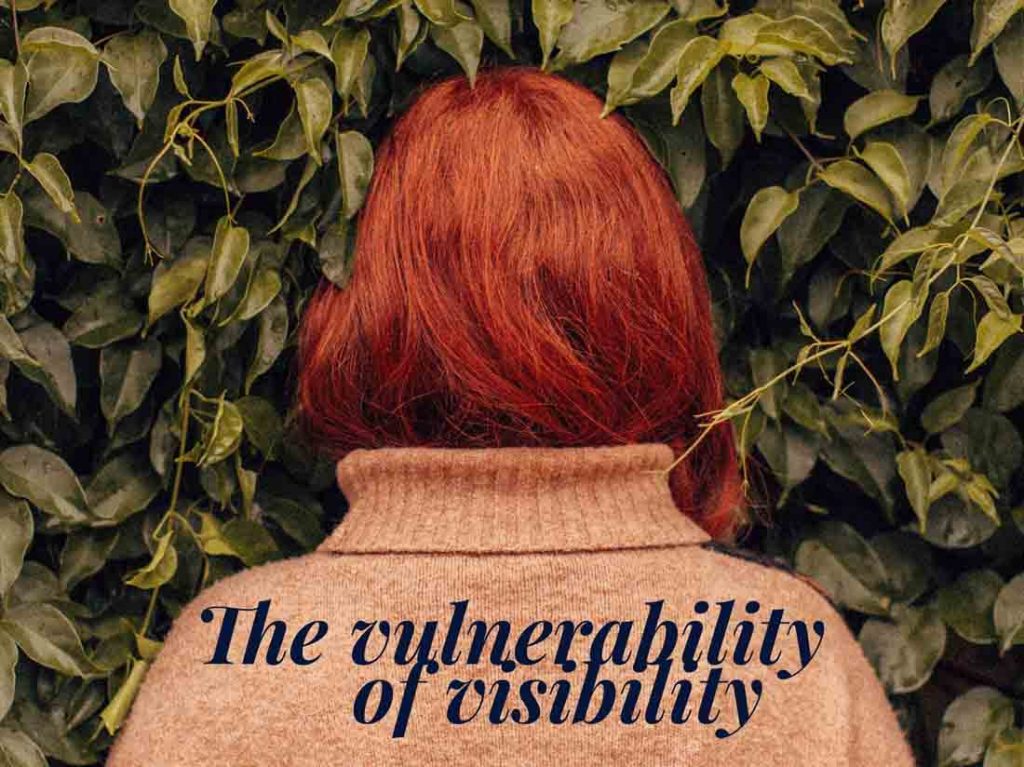I’ve lost track of the number of women who have confided in me how vulnerable it feels to use the internet to talk about themselves and their businesses. Often these women are in their 40s or 50s, with corporate backgrounds, some with considerable management experience, sizeable teams and budgets of millions.
Which makes it all the more confusing and confronting why marketing as a sole trader in a fledgling little business feels so vulnerable. This has happened too many times to be mere coincidence.
It’s vulnerable to represent yourself in business, with no boss, department or brand to hide behind. When we pitch, it feels personal. Add sensitivity to this, and all rejections in business feel like a personal smite.
“Don’t take it personally, it’s just business” is easy to say. In reality, our visibility makes us vulnerable, which makes us blocked, fearful, and stressed.
The many and varied ways we choke our visibility
Oh! The many and varied ways that we choke our visibility and subtly undermine ourselves in business.
- Reverse-engineering and copying our competitors, believing this necessary if others are to take us seriously.
- Talking strictly about what we do, while resisting temptation to discuss other, broader issues that relate to our industry or business.
- Jumping on the bandwagon to express popular, positive opinions to cultivate likability.
- Avoiding expressing anything potentially controversial so that you don’t inspire dislike, criticism, unfollowing or unsubscribing.
- Doing qualification after qualification in a quest to overcome inhibitions, self-doubt and uncertainty.
- Waiting for a particular event or thing to happen that will signify that you’re more credible, so you can finally launch the business/program/book/thing that you dearly wish to.
- Putting others on a pedestal, believing there’s no way you could be like them, because of your limitations, perceived and actual, that they don’t appear to have.
Your silence will not protect you
 As women, we are told not to speak too loudly, not to be disagreeable, to be likeable, to smile and be attractive, to be thankful and grateful.
As women, we are told not to speak too loudly, not to be disagreeable, to be likeable, to smile and be attractive, to be thankful and grateful.
But, especially as we age, swallowing your opinion will not save you from your aspirations and the quiet growl of desperation that wakes you up at 2am.
Whatever limitations, both real and perceived, that stop you from being truly visible become internalised oppression.
As James Baldwin, American novelist and social critic, puts it: “It’s not the world that was my oppressor, because what the world does to you, if the world does it to you long enough and effectively enough, you begin to do to yourself.”
Of course you don’t enjoy promoting yourself – you’ve been actively discouraged from doing so. It’s likely that you’ve not been encouraged to speak up, but instead taught to go with the flow, not cause a fuss, get a good job, seek predictability and security.
In self-employment, we are playing an entirely different game: we must get comfortable, or at least, not strung out, by unpredictable cashflow; we need to embrace our opinions and share them widely and repeatedly to grow our personal brand and inspire trust; we need to seek opportunities endlessly; we need to advocate for ourselves, get comfortable with saying no and repeatedly ask for what we want.
And if you feel uncomfortable about any of this or aren’t earning what you’d like to be, popular entrepreneur propaganda will blame you – it’s because you have low self-esteem and don’t truly believe in yourself.
If you’re uncomfortable being visible it’s because you’ve not been socialised that way. And socialisation doesn’t stop once childhood ends.

Vulnerability hangovers
To put the final nail in the coffin, recent research, notably from Brené Brown, suggests that being vulnerable in what we communicate makes us relatable in our audience. This is true to an extent – but unless you have a background in Public Relations, how do you know where the edge is – between sharing intimate stories online and damaging your professional reputation?
Of course, once you share your personal story online, you open yourself up to misinterpretation and misunderstanding. You attract those who love to take offence, and inadvertently trigger your competitors, often through their jealousy.
Now you’re suffering from the vulnerability hangover – a rite of passage for all online entrepreneurs – where you regret your outpouring and consider fleeing the country and establishing a new identity.
So, what to do? Your silence will not protect you.
Baby steps
Being visible is a daily practice – to take up more space, say no, speak the unpopular opinion, engage in difficult conversations – with kindness, and care, and courage, despite how it makes you and others feel.
Recognise where you’re at on the spectrum of visibility – likely somewhere between Oprah and a hermit. Don’t attempt to leapfrog the process, pushing past intense discomfort, but don’t let a little discomfort stop you. Socialisation takes time and patience to dismantle.
Boundaries are imperative, dear reader, to build you up and make you strong in your visibility. Your self-care is not a privilege, it’s a non-negotiable. Some regular time – whether it be the weekends or other times – must be sacrosanct from work. Reach out, retreat; reach out, retreat. As smart phones make you endlessly available to people, take back control by recognising it’s convenience for you, not everybody else.
The more personally important, relevant, and powerful your work, the more scary and threatening it will feel and the more it will legitimately provoke others who are threatened by your attempts at changing the status quo.
Your self-care is imperative because visibility can be hugely vulnerable (no, it’s not just you) and when you’re to keep fighting the good fight, your first obligation is to yourself.
Ready to turbo-charge your visibility while safeguarding your sanity? Time for the Hustle & Heart program.





